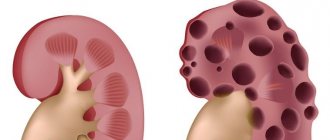In the article we tell you who a urologist is: what he treats for men and women, what diseases and symptoms should be addressed, who is recommended to undergo preventive examinations by a urologist and at what age. We will also tell you how the examination is carried out and what methods are used for diagnosis.
The differences in the functioning of the organs of the genitourinary system in men and women, in adults and children are so striking that separate areas and specializations have been formed in urology.
For men (18+)
A doctor who treats diseases of the male genital area is called a “urologist-andrologist”, “urologist-sexologist”. Representatives of the stronger sex should contact him for any changes in the functioning of the genital organs (internal and external).
Urological symptoms in men
The disease does not always signal itself with acute pain. Some serious problems begin with subtle changes that may not seem worthy of a trip to the doctor. Therefore, urologists recommend that men pay attention to their sensations during or after urination, during and after sexual intercourse. And if you feel any changes, even minor ones, do not hesitate to visit a doctor.
You need to consult a male urologist-andrologist if you are concerned about:
- Acute pain in the groin, penis, testicles, lower abdomen, prostate area.
- Frequent, prolonged or constant nagging, aching pain in the groin area (inside and/or outside).
- Change in urination pattern.
- Frequent urination.
- Feeling of incomplete emptying of the bladder.
- Itching, burning in the groin area.
- Redness, swelling of the testicles and/or penis.
- Discharge from the genital tract.
- Pain when urinating, cutting, burning.
- Pain during sexual intercourse or ejaculation.
- Blood in semen.
- Problems with potency.
- Ejaculation too early.
- Infertility.
Urological diagnoses in men
The listed symptoms often turn out to be signs of diseases of varying severity.
Most often these can be:
- Inflammation (prostatitis, urethritis, cystitis, balanoposthitis, etc.)
- Infections.
- Sexually transmitted diseases.
- Vascular problems - poor circulation in the vessels of the genitourinary system.
- Hormonal disorders (lack of testosterone, hypogonadism, etc.)
- Stones in the prostate.
- Erectile disfunction.
- Premature ejaculation.
- Benign tumors.
- Malignant neoplasms.
Preventive examination for men (40+)
Preventive measures, of course, will not hurt anyone. Men at any age should pay due attention to their intimate health. For example, once a year, even if nothing worries you, it is recommended to do an ultrasound of the prostate. It is also advisable to add an annual visit to the urologist to your list of healthy habits.
However, if up to 40 years of age this advice is advisory in nature, then for men over 40 years of age it becomes mandatory. After 40 years, men should not wait for any symptoms to appear.
We would like to draw your attention to the fact that in European countries, systematic visits to a urologist are the same norm for men as, for example, visits to a hairdresser. The result of this attitude towards oneself is higher indicators of public health and average life expectancy in European countries.
At least once a year you must undergo:
- preventive examination by a urologist;
- Ultrasound (TRUS) of the prostate gland;
- PSA blood test (for early diagnosis of prostate cancer);
- tests for sex hormones;
- tests for infections.
The urologist may prescribe other types of diagnostics, depending on the symptoms and the results of studies already performed.
Does everyone need circumcision?
At one time in the United States, almost everyone was circumcised to reduce the risk of STDs. It all started with sailors, when men were going to serve in the navy, they were told: “If you’re not circumcised, you won’t enroll.” Because, as they say, stop at ports - and treat them later. Circumcision is also believed to reduce the risk of penile cancer, although statistically speaking this is a very small number. This is, in general, a rare disease.
Now such general circumcision is being done less and less - the fashion has passed, and other factors influence it. Babies were often circumcised not even by urologists, but by obstetricians-gynecologists at birth. The decline in the popularity of circumcision is also due to the fact that with any intervention there is a risk of complications. There is an opinion that it is small, and one in 100,000 is not much, but it is not much until you or your child becomes that one. Therefore, now there is a very restrained attitude towards preventive operations - they simply cut something off less and less often.
By the way, the situation is similar with varicocele, an enlargement of the veins in the testicles, which is sometimes associated with infertility. Even now there are colleagues who recommend surgery to everyone who has a varicocele. About 15% of men have this condition - this is a large number. But not all of them need surgery; for some, on the contrary, it is contraindicated.
For women (18+)
A doctor who treats female urological pathologies is called a “urogynecologist” or “urologist-gynecologist.” The most popular female urological problems are:
- cystitis;
- urethritis;
- overactive bladder.
Among the symptoms for which you should immediately visit a female urologist:
- frequent urination;
- pain, burning, cramping when urinating;
- feeling of incomplete emptying of the bladder;
- urinary incontinence (involuntary release of drops of urine when sneezing, coughing, laughing and other sudden movements).
Is it possible to reduce the risk of kidney stones?
The easiest way is to drink a lot of water; this is the most common recommendation at appointments. This generally prevents many health problems. The kidneys secrete about 1.5-2 liters of urine per day, but at the same time they pass up to 100 liters of liquid through themselves, so the fear of “flooding the kidneys” is not entirely justified, this is also part of the realm of myths - the kidneys have a gigantic working reserve. Moreover, if a person has one kidney removed, the second will take on all the work and cope. We recommend drinking enough water so that your urine is light or almost clear.
Other specializations
Differentiation by gender and age alone was not enough. Therefore, doctors were also identified who specialize in the treatment of certain groups of diseases that are particularly complex and dangerous.
- Kidneys.
A urologist who treats the kidneys of men, women and children is a nephrologist. This doctor diagnoses and treats urolithiasis (kidney stones), pyelonephritis, polycystic kidney disease, hydronephrosis, renal failure and many other kidney diseases. A nephrologist deals exclusively with conservative treatment of the kidneys. If kidney surgery is needed, he refers you to a urologist-surgeon. - Oncology.
A urologist-oncologist is a doctor who provides conservative treatment and surgical removal of benign and malignant tumors in the organs of the urinary system. - Tuberculosis of the genitourinary organs.
Tuberculosis can affect the kidneys, ureter, bladder, and urethra. prostate. Phthisiourologists diagnose and treat such diseases. - Emergency care, including surgery.
Urology specialists working in emergency and emergency departments see patients with genital injuries, acute urinary retention (AUR), and bleeding from the urinary system. Urological surgeons use various types of operations in their practice - endoscopic, laser, transurethral, laparoscopic, retroperitoneal, robot-assisted, abdominal.
Prostate adenoma is a death sentence and will it only get worse?
No, absolutely not. Most men after 40–50 years old develop an adenoma to one degree or another, and by the age of 90, all of them do. But in only about a third of them it becomes a disease; for the rest it is, let’s say, a process of growing up.
Adenoma is not a death sentence; most men do not even require treatment and observation is sufficient.
For most people who do need to be treated, there are solutions for conservative treatment of this disease. And only 25-30% of this third may ultimately require surgery.
Preparing for your appointment
In most cases, no special training is required. Regular hygiene procedures are sufficient.
However, sometimes you may need to come to your appointment on an empty stomach (if you need to take tests) or with a full bladder (if you plan to have an ultrasound). In certain cases, you may be advised to abstain from sexual intercourse for 1-2 days before your appointment. Therefore, when making an appointment, it is advisable to briefly explain to the specialist what is bothering you and clarify whether you need to prepare for an appointment with a urologist.
Male infertility - should you be afraid of it and what to do?
There is no need to be afraid of anything. First, you need to determine whether this is infertility or a state of subfertility, that is, reduced ability to conceive. There are statistics that it is worth starting to be examined in this area if a generally healthy couple does not conceive within a year with regular sexual activity - precisely with regular, and not occasionally. If the woman in the couple is over 35 years old, then this period is reduced to six months. This is due to the fact that many modern women have a reduced ovarian reserve (total number of eggs), this is due to interventions and other factors.
Whatever the cause of male infertility, this is not a death sentence. Even if we are talking about an extreme degree - azoospermia, in which there are no sperm in the ejaculate. Now there are methods that allow you to conceive a child, at least within the framework of IVF.
One of the common causes of difficulty conceiving is obstruction of the vas deferens, which in turn can occur as a result of many factors. Most often this is a chlamydial or myoplasma infection, complications after gonorrhea. There are genetic forms in which critically few sperm are produced. We successfully overcome all this with the help of microsurgical operations that allow us to obtain sperm directly from the testicle or epididymis.
In any case, there is absolutely no need to despair.
How is the inspection carried out?
A consultation with a urologist usually begins with a conversation between the doctor and the patient. The doctor may ask a number of questions, for example:
- what worries the patient;
- with what frequency and intensity certain symptoms occur and how significantly they worsen the quality of life; in this regard, it may ask you to remember how many times a day you urinate, whether you notice any discharge, under what circumstances pain occurs;
- Then he collects anamnesis, that is, he asks what you have been sick with before, whether you have chronic diseases, whether you are currently taking any medications, whether you have any allergic reactions, etc.
Examination for men
Depending on the symptoms that torment you, an examination by a male urologist may include:
- Palpation examination of the lower abdomen and lower back.
Light pressure with your fingers on the stomach, with the help of which you can find painful areas, and also feel the enlargement of internal organs, compactions, etc. It is carried out in a lying position on the couch, less often - standing. - Visual examination of the external genitalia.
Allows you to see redness, rashes, swelling, various growths (warts, atheromas, papillomas, etc.). - Ultrasound of the prostate gland.
In the absence of contraindications, TRUS (transrectal ultrasound, through the anus) is recommended, since it is much more informative than transabdominal ultrasound (through the skin of the abdomen). TRUS of the prostate allows you to determine the size of the prostate gland, the exact location of the adenoma, determine the presence/absence of stones in the prostate, and even identify signs of prostate cancer at an early stage. A contraindication to TRUS may be acute pain in the anus caused by hemorrhoids or anal fissures. - Ultrasound of the bladder.
It is most often carried out with a transabdominal sensor, that is, through the skin of the abdomen. Allows you to diagnose the presence of residual urine, assess the size of the bladder, wall thickness, detect foci of inflammation or neoplasm, determine their size and location, etc. - Laboratory research.
These include various types of blood, urine, and smear tests. Prescribed for suspected infections, inflammatory processes, hormonal deficiency, and oncological changes. - Urological tests.
They are carried out if there are problems with potency and/or ejaculation. They allow you to diagnose the presence or absence of vascular diseases of the genital organs, which most often cause sexual disorders in men.
We have listed the main diagnostic methods that can be performed on the day of the initial examination by a male urologist. Based on the results of these studies, the doctor may advise you to undergo additional examination (MRI, CT, biopsy, spermogram, cystoscopy, ultrasound of the thyroid gland, kidneys, etc.).
Examination for women
A female urologist-gynecologist first examines patients on the couch and conducts a palpation examination (pressure and tapping) of the abdomen and lumbar region. Then, in the gynecological chair, he takes a smear and checks the condition of the urethra. An ultrasound (bladder, kidney) and tests (blood, urine) are required. In general, we can say that an examination of women by a urologist is not much different from an examination by a gynecologist.
Is it normal to have a small penis?
Fear related to size is one of the most common. Recently, colleagues conducted a survey - according to its results, it turned out that the average size of the penis is 21 cm. When the participants were asked to try to measure again and were taught exactly how, it turned out that the average length is still 13 cm. These are the average statistical figures - 12-16 cm - moreover, it is necessary to measure not just “from the abdomen”, but from the pubic symphysis. Some people have fat there - if you don’t measure it, then you can count less. Many people are dissatisfied with their appearance, and dissatisfaction in this area is also common, but this does not mean that there is a real reason for alarm and any serious measures. I am not a supporter of penis enlargement without indications.
There are also pathological deviations - there is the concept of “micropenis”, there is a hidden penis. In the vast majority of situations, a person can be helped - modern medicine is not about despair at all. There is a whole subsection of genital surgery in urology, these specialists who perform complex operations on gender reassignment, reduction, extension, enlargement, compression. To the point that you can make a new penis from the latissimus dorsi muscle. A man tenses a muscle and it’s as if he has an erection. I do not know this surgery, but I am familiar with similar specialists. There is almost always a solution that allows a person to be sexually active, even if it seemed that there was no chance - for example, with a traumatic loss of the penis.
How to choose a clinic and a doctor without being disappointed?
Today it has become very popular to choose doctors based on reviews on the Internet. This method seems at first glance convenient, fast and simple. But do not forget that reviews do not always reflect reality. In addition, the principles of a doctor’s work very often depend on the norms and rules established in the clinic.
Therefore, look not only for a good urologist, but also for a good clinic! When searching, we recommend paying attention to the following nuances:
- Are there urologists with a narrow specialization in the clinic?
If there are doctors who specialize in male urologist-andrologist and female urologist, this is definitely a good sign. It’s even better when not everyone is signed up for a consultation, but when talking on the phone they explain what diseases the clinic specializes in. This approach demonstrates the respectful attitude of the clinic owners towards both patients and doctors. With this approach, the possibility of wasting time is almost completely eliminated for both parties. - Is it possible to schedule a consultation at a convenient time?
Most diseases in urology require fairly long-term therapy (one course can last an average of 2-3 weeks). We recommend that you make sure in advance that doctors work in this particular medical center at least 5 days a week, on different shifts. This schedule provides an almost 100% guarantee that you will be able to see your doctor at a convenient time. - How long does the initial appointment last?
What does it include? The optimal duration of the first dose is 30-40 minutes. The initial consultation is a very important stage. Both the doctor and the patient need to receive a fairly large amount of information from each other. The accuracy of the diagnosis and the ability to identify contraindications before the start of treatment largely depend on this. In addition, it is very important to carry out an examination on the day of the first visit - examination, ultrasound, urological tests, tests. This is especially important when you experience pain or problems with urination. After all, if a comprehensive examination is carried out during the initial appointment, the doctor will be able to give the first recommendations on the same day. - What is included in the cost of treatment?
There are two main options.One of them involves paying for each medical service separately
. That is, you pay for each consultation with the attending physician, for each injection and any other service. You purchase all prescribed medications at the pharmacy. If the drug is not suitable, again, buy another one yourself. If you need to expand the course by adding additional procedures, you pay again.
The second option is to pay for the full course of treatment. You do not pay for the N number of different services, but for a comprehensive program on the “All inclusive” principle
. This program includes everything you need:
- procedures;
- drugs (painkillers, anti-inflammatory, antifungal, antibiotics, etc.);
- Consumables;
- consultations with the attending physician - in person and by telephone;
- additional examinations (for example, tests, ultrasound, urological tests);
- additional procedures and medications (if necessary);
- observation after treatment.
- Is there a pre-registration for procedures?
A “waiting queue” for paid medicine is not an option. You must be sure that when you arrive at the clinic at the appointed time, you will get to the treatment room or to the doctor, who are waiting for you at that moment. - Is it possible to pay in stages (installments/credit)?
Surprisingly, as practice shows, such services are still not provided in every paid urology. Of course, prices in Russian clinics are several times lower than abroad. However, whatever the cost, you should have the opportunity to choose the most comfortable payment option.
The choice is always up to the patient. If the problem is not serious, then it may turn out that it is more profitable to pay for each service individually. However, you need to understand that with this option you will be forced to pay essentially “for every minute of the doctor’s attention.”
When choosing the “All inclusive” option, you pay once, and you are treated until a state of stable remission is achieved.
What common fears associated with urological diseases are unfounded?
Fear about the degeneration of an adenoma into cancer, for example, is unfounded - contrary to what unfair advertising sometimes tries to impose. “Have you been checked for hidden infections? Otherwise they will cause prostatitis, adenoma, and then cancer.” Not only is this not the case, this is precisely what becomes the cause of fear - a person decides not to go anywhere and not get checked, they say, what will happen will not be avoided, and this is precisely harmful to health.
Yes, it’s better not to get an STD, and yes, almost all men eventually develop an adenoma, but no, it does not turn into cancer. In men after 45-50 years of age, a parallel risk of prostate cancer does appear, but they are not related to each other, they even grow from different parts of the prostate gland.
There is also a fear of operations. All normal people are afraid of operations, this is a natural fear. But surgery is not always a scary, serious intervention and difficult recovery; sometimes a couple of days are enough for it. Here you always need to look for a middle ground, so as not to succumb to the provocations of doctors and not to do unnecessary manipulations, but also not to miss the moment, not to let the problem become difficult to solve or insoluble instead of performing a good, elegant operation, after which the person will forget about this problem . Now, for example, after surgery for an adenoma, a person spends one day in the hospital and returns to normal life.
The history you deserve
The starting point for communicating with a doctor is taking an anamnesis. A good specialist, like an experienced detective, will interrogate you with passion, having learned the history of your illness: he will ask about complaints, find out about your stool, bad habits and other important things. The more questions the doctor asks, interested in your health and lifestyle, the better he understands the reason for your request. Accordingly, the more you tell the doctor about yourself, the better for you. If you abuse alcohol, smoke, yesterday you had unprotected sex, and tomorrow you are going to dive into an ice hole, you need to tell your doctor about it. And remember, medical confidentiality for any self-respecting doctor is not empty words.










